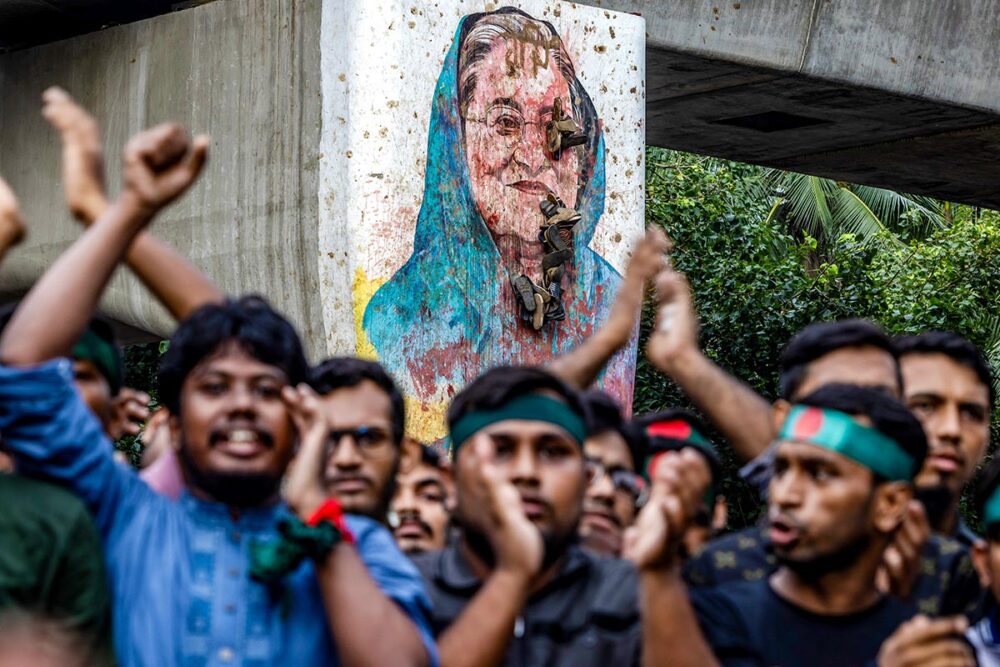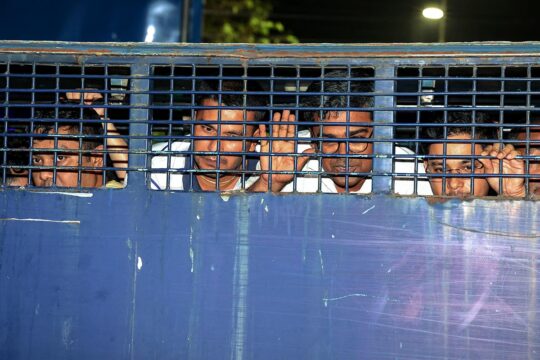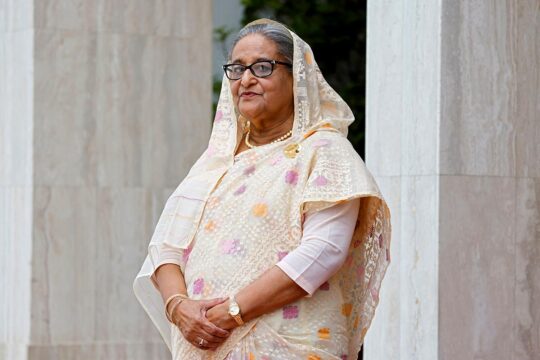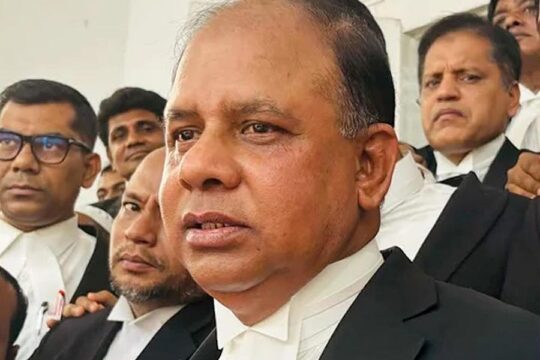The in absentia trial of Sheikh Hasina, the former prime minister of Bangladesh, started on 3 August 2025 in the country’s International Crimes Tribunal (ICT) in Dhaka. Hasina is accused of crimes against humanity in relation to a bloody crackdown on people protesting against her government in July and early August 2024 which killed hundreds.
Bangladesh’s health ministry has confirmed a list of over 800 people killed during the protests, though in its opening statement in court, the prosecution alleged that over 1400 people were killed “at the hands of state security forces and the ruling party’s armed cadres”.
Hasina, who fled Bangladesh on the afternoon of 5 August 2024, after the country’s chief of army staff told her that it could not guarantee her safety, is currently in exile in India. She has ignored formal requests for her to return. Her former home minister, Asaduzzaman Khan Kamal, is also tried in absentia since, like Hasina, he escaped Bangladesh. The only accused present in the dock is the former inspector general of police (IGP), Chowdhury Abdullah Al-Mamun, who prior to the start of the trial gave a confessional statement to a magistrate and agreed to provide evidence against his co-accused – which could allow him to receive a reduced sentence.
So far, 23 witnesses called by the prosecution have given evidence. Most of them were themselves shot by law enforcement authorities, while other witnesses are family members of those killed by shooting, or medical staff.
“Innocent and unarmed student-protestors” targeted
“The prosecution will prove before this tribunal that in July and August 2024, the ruling Awami League government, with the aim of suppressing and persecuting peaceful student-people’s movements and political dissidents, targeted innocent and unarmed student-protestors who were participating in the anti-discrimination student movement”, the chief prosecutor, Tajul Islam, said in his opening statement in a court full of lawyers and journalists.
Islam used to be a leading member of the Jamaat-e-Islami party’s legal defence team when its leaders, a decade earlier, stood trial before the ICT for war crimes during the country’s 1971 war of independence. While pursuing his opening statement, now as chief prosecutor, Islam said the former Awami League government carried out “various forms of attacks, persecution, repressive policies, mass arrests, legal harassment, threats, and violence”. “A coordinated institutional repressive policy was deployed with the cooperation of state security and intelligence agencies”, he said, including the Directorate General of Forces Intelligence, the National Security Intelligence, the Counter Terrorism and Transnational Crime, and the Special Branch.
Protestors were identified with drones, phone tapping, location tracking technology, and repressive measures were taken, Islam added. “Simultaneously, the Awami League and its affiliated organizations, the Chhatra League and the Jubo League [the student and youth wings of the Awami League], deployed armed cadres at the local level to identify protestors. Based on this intelligence, law enforcement agencies, especially the police and Rapid Action Battalion (RAB), carried out crackdowns, arrests, and violent attacks.”
Islam argued that “all these programs were executed under the direct orders of the then autocratic prime minister Sheikh Hasina and through the oversight of the then road transport and bridges minister Obaidul Quader, the then home minister Asaduzzaman Khan Kamal, and the then IGP Chowdhury Abdullah Al-Mamun, and other political leaders, administrative officials, their subordinate officers, and security forces”. Obaidul Quader, who has not been arrested and is also believed to be in India, is not a defendant in this trial, but he is accused in another ICT case.
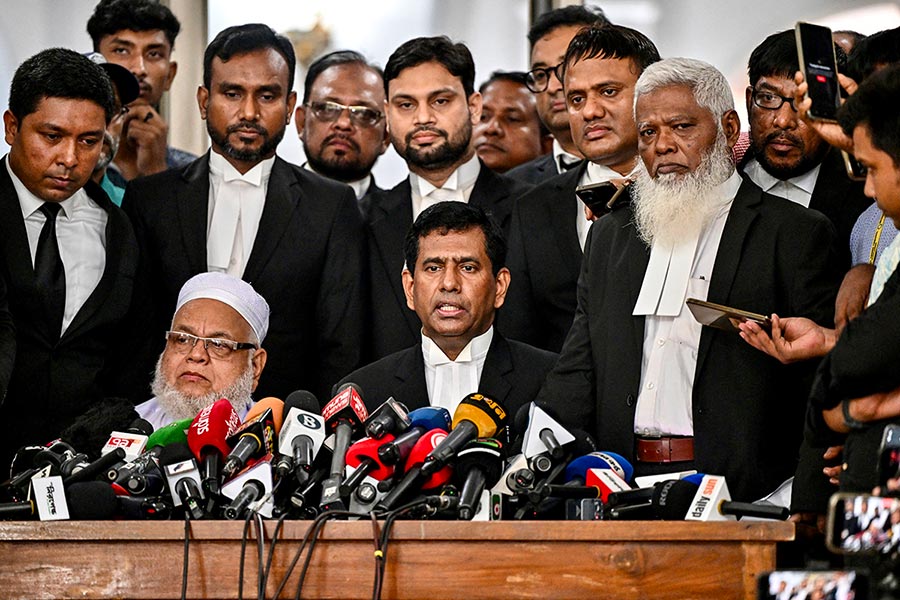
“Widespread, systematic, and deliberately planned” attacks
The chief prosecutor said the prosecution will focus on “11 symbolic incidents” which, he said, had been selected to prove each element of crimes against humanity as recognized under international law. “Through these incidents, the prosecution will demonstrate that the attacks on the civilian population were widespread, systematic, and deliberately planned,” he told the ICT. “Each incident will serve as a lens through which the tribunal can see how crimes such as murder, persecution, torture, arbitrary detention, and sexual violence were systematically and extensively committed using the entire state apparatus.”
The chief prosecutor stated that “the central strength of the prosecution’s case is the irrefutable power of direct evidence”, including “the former prime minister’s own recorded statements, recorded audio, and various clear directives she issued during those calamitous days”. Islam pointed out that this was not circumstantial evidence, but “undeniable and direct proof that opens a rare and secret window into the intent and planning at the highest levels of government”.
“The evidence that will be presented before this tribunal is not a collection of disjointed pieces of ambiguous information, but an unbroken and solid chain of evidence, where each part strengthens the next. The totality of this evidence - eyewitness testimony, digital records, government communications, and forensic reports - is so clear and powerful that there can be no room for any doubt. This unequivocal and irrefutable evidence will prove beyond a shadow of a doubt the crimes of Sheikh Hasina and the culpability of her co-accused.”
As an illustration, the chief prosecutor quoted a recorded phone conversation between Hasina and her nephew, Sheikh Fazle Noor Taposh, the former mayor of South Dhaka, where she says she ordered the RAB to open fire: “I’ve already given the instruction, this is the standing instruction now, they are to use lethal weapons now. Wherever [they] encounter [them], [they] will shoot immediately.”
Hasina, “the central figure” of all crimes
According to the chief prosecutor, the three accused, “from their positions of highest authority, through a joint criminal enterprise and command responsibility, directed their subordinate forces and the armed cadres of their party to carry out deadly attacks across the country”. Islam stated that as an autocratic ruler, the former prime minister Hasina “single-handedly made all important decisions”. “Her subordinate officials were always eager to implement her orders, both politically and administratively,” he said.
“The sole purpose of the crimes against humanity committed during the July movement was to keep Sheikh Hasina in power. She was the central figure or nucleus of all these crimes. The other accused, serving under her, understood that their security and rewards depended on Sheikh Hasina remaining in power,” he claimed, adding that the former home minister “had full control over the country’s law enforcement agencies” and that “all decisions regarding the suppression of the movement were made in the ‘Core Committee’ meetings held at his Dhanmondi residence”.
But the chief prosecutor’s words and arguments cannot be heard by Hasina as the former prime minister is not present in the dock for her own ICT trial. In absentia trials are allowed under Bangladesh law but most international tribunals do not allow such proceedings, and many consider them controversial. In his opening statement, Islam defended the in absentia proceedings stating that the absence of the former ministers “cannot and will not be a barrier to ensuring accountability for the crimes. He said that the Hasina and Kamal have repeatedly remained absent, failing to surrender to the jurisdiction of the court and that “the wilful absconding of the accused or the inaction of any foreign state cannot obstruct this tribunal’s pursuit of truth and its solemn duty to ensure justice”. “The arm of justice is long, absence or indifference cannot stop it”, he concluded.
“My eyes, nose and face were hit”
The first witness to give evidence was 23-year-old driver Khokon Chandra Barman who has had a significant part of his face blown off by gunfire. On 5 August 2024, he had been marching with other protestors towards Dhaka and they arrived in the Jatrabari neighbourhood in the capital city just after midday. He said that he saw “a BGB [Border Guard of Bangladesh] shoot a person. He was bleeding as if a cow have been slaughtered. That bullet went out of this person’s body and hit another person who was injured as well”.
Barman said that the crowd then heard news that Hasina had resigned, but after army officials left the area, police officers came out of a police station and “started targeting and shooting at us”. At one point, he said, he took shelter behind an obstacle under the elevated roadway. “There a policemen noticed me and shot at me, targeting my head: my eyes, nose and face were hit,” he said. The prosecution then showed a video of Barman, lying in the road, beckoning with his arms, moments after he was shot.
Amongst the 23 witnesses who have so far testified, a doctor at the national institute of neurosciences and hospital told the court that during the protests, 167 severely injured people were admitted into the hospital, many shot in the head. He added that on 19 July 2024, members of the detective branch of the police, warned him not to provide treatment to gunshot victims and not to admit any further injured patients. “Detective branch personnel warned: ‘Do not be overzealous. You will get into trouble. Do not release those already admitted. There are instructions from above, and legal action will be taken against them’,” he said.
The Awami League’s response to the trial
The court has appointed Amir Hossain, a seasoned criminal lawyer, as the state defence counsel to represent both Hasina and Kamal. He received the evidence relied on by the prosecution on 25 June 2025, five weeks before the first day of the trial. When he was asked whether five weeks were sufficient time to prepare, he said, “when I need an adjournment, I will ask for one”.
One issue is whether Hossain is able to cross examine the witnesses about “contradictions” in their evidence between what they had originally told investigators and what they stated in court. On the first day of the trial, ICT judges agreed with Islam that the state defence lawyer was not allowed to cross examine the witnesses, although this kind of cross examination is a standard practice in ordinary Bangladesh criminal courts.
As for the Awami League party, its spokesperson, Mohammad A. Arafat, said in a public statement that the party “categorically rejects the politically motivated charges brought against its leadership”. “The events of last July were tragic and chaotic. Law enforcement responded to escalating mob violence with the tools available. By then, the elected government had effectively collapsed,” he said.
“To suggest Sheikh Hasina was directing real-time tactical decisions is absurd. No democratically elected leader should be prosecuted for upholding constitutional duties in the face of violent insurrection,” he pursued, adding that Hasina’s actions “were in line with the constitution and aimed at national stability”.
The trial is likely to last months, however, the government has made clear that it expects a judgment to be given by the time of the national election due to be held in February 2026. The prosecution has announced it would call a total of 40 witnesses to testify, while the defence has not announced any figures yet. If convicted, Hasina and her co-defendant Kamal could be sentenced to death, which is applicable in Bangladesh. The other accused, Al-Mamun, will likely receive a prison sentence.


